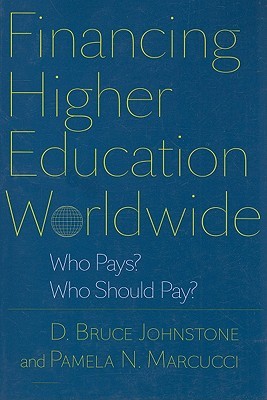
- We will send in 10–14 business days.
- Author: D Bruce Johnstone
- Publisher: Johns Hopkins University Press
- ISBN-10: 0801894581
- ISBN-13: 9780801894589
- Format: 15 x 22.6 x 2.3 cm, softcover
- Language: English
- SAVE -10% with code: EXTRA
Reviews
Description
No issue in higher education is as salient, or as controversial, as finance. As demand for higher education around the world grows, so do the costs associated with it, especially as governments shoulder less of the burden. Tuition fees rise and student loan debt grows. Who pays for these surging costs? Who should pay?
D. Bruce Johnstone and Pamela N. Marcucci examine the universal phenomenon of cost-sharing in higher education--where financial responsibility shifts from governments and taxpayers to students and families. They find that growing costs for education far outpace public revenue streams that once supported it. Even with financial aid and scholarships defraying some of these costs, students are responsible for a greater share of the cost of higher education.
Featuring comprehensive economic and policy data, the authors' international comparative approach shows how economically diverse countries all face similar cost-sharing challenges.
So, who should pay for higher education? While cost-sharing is both politically and ideologically debated, Johnstone and Marcucci contend that, for almost all countries, it is imperative for the financial health of colleges and universities, bringing better efficiency, equity, and responsiveness.
Financing Higher Education Worldwide combines sophisticated economic explanations with sensitive political and cultural analyses of the financial pressures facing higher education throughout the world.
EXTRA 10 % discount with code: EXTRA
The promotion ends in 15d.13:54:15
The discount code is valid when purchasing from 10 €. Discounts do not stack.
- Author: D Bruce Johnstone
- Publisher: Johns Hopkins University Press
- ISBN-10: 0801894581
- ISBN-13: 9780801894589
- Format: 15 x 22.6 x 2.3 cm, softcover
- Language: English English
No issue in higher education is as salient, or as controversial, as finance. As demand for higher education around the world grows, so do the costs associated with it, especially as governments shoulder less of the burden. Tuition fees rise and student loan debt grows. Who pays for these surging costs? Who should pay?
D. Bruce Johnstone and Pamela N. Marcucci examine the universal phenomenon of cost-sharing in higher education--where financial responsibility shifts from governments and taxpayers to students and families. They find that growing costs for education far outpace public revenue streams that once supported it. Even with financial aid and scholarships defraying some of these costs, students are responsible for a greater share of the cost of higher education.
Featuring comprehensive economic and policy data, the authors' international comparative approach shows how economically diverse countries all face similar cost-sharing challenges.
So, who should pay for higher education? While cost-sharing is both politically and ideologically debated, Johnstone and Marcucci contend that, for almost all countries, it is imperative for the financial health of colleges and universities, bringing better efficiency, equity, and responsiveness.
Financing Higher Education Worldwide combines sophisticated economic explanations with sensitive political and cultural analyses of the financial pressures facing higher education throughout the world.


Reviews